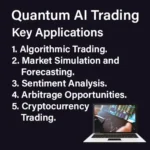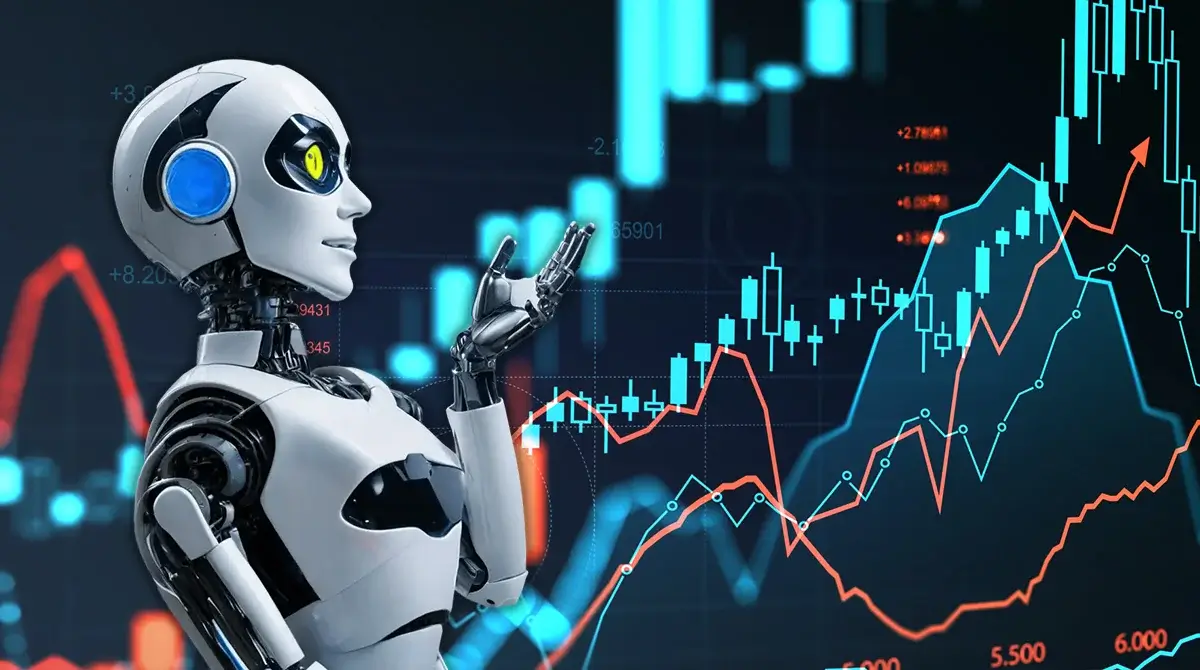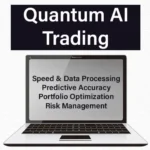The Future of Financial Markets
Financial markets have long been driven by technological innovations, from the introduction of computerized trading in the late 20th century to the rise of algorithmic trading. Today, we stand on the cusp of another major evolution: Quantum AI Trading. This revolutionary approach combines the unparalleled processing power of quantum computing with the predictive capabilities of artificial intelligence (AI). Together, they offer a way to process massive datasets in real-time, optimize complex trading strategies, and reduce risk in unprecedented ways.
In this in-depth exploration, we’ll cover the basics of quantum computing and AI, how their fusion leads to Quantum AI Trading and how this technology is poised to transform the financial landscape.
Understanding Quantum Computing
Quantum computing is an advanced type of computation that goes beyond the limitations of classical computers. While classical computers use bits (represented by 0s and 1s) to process information, quantum computers use qubits, which can represent both 0 and 1 simultaneously due to a property called superposition. This enables quantum computers to handle exponentially more data than traditional systems, making them ideal for solving complex, large-scale problems.
Quantum computers also exhibit entanglement, where two qubits become interconnected and the state of one qubit can directly influence the state of another, regardless of the distance between them. This property significantly enhances the processing power of quantum computers, enabling them to perform complex calculations in parallel rather than sequentially.
Quantum Computing in Financial Markets
In financial markets, where traders analyze vast amounts of data to make decisions, quantum computing’s potential is extraordinary. Complex financial models, which involve multi-variable equations and massive datasets, are currently constrained by the limitations of classical computers. Quantum computers, however, can process multiple variables and scenarios in parallel, drastically speeding up calculations related to market trends, risk assessments and trading strategies.
Artificial Intelligence & Trading
Defining Artificial Intelligence
 Artificial intelligence (AI) refers to the ability of machines to perform tasks that would typically require human intelligence, such as learning from experience, recognizing patterns and making decisions. In trading, AI is often used to develop models that predict market trends, automate trades and manage portfolios. AI systems can analyze large datasets, identify patterns and adjust strategies in real-time to optimize returns.
Artificial intelligence (AI) refers to the ability of machines to perform tasks that would typically require human intelligence, such as learning from experience, recognizing patterns and making decisions. In trading, AI is often used to develop models that predict market trends, automate trades and manage portfolios. AI systems can analyze large datasets, identify patterns and adjust strategies in real-time to optimize returns.
Common AI techniques used in trading include:
- Machine Learning (ML): A subset of AI that involves training algorithms on historical data to identify patterns and make predictions.
- Deep Learning: A more advanced form of machine learning that uses neural networks to simulate human decision-making processes.
- Natural Language Processing (NLP): AI systems that analyze unstructured data, such as news articles and social media posts, to gauge market sentiment.
AI’s Role in Financial Trading
AI has already become integral to financial markets. High-frequency trading (HFT) firms use AI to analyze market data and execute trades within milliseconds, often gaining a competitive edge through the speed and accuracy of their algorithms. AI also powers predictive models that help traders forecast market trends, assess risks and manage portfolios. These models continuously learn from new data, improving their performance over time.
Despite its advanced capabilities, AI is still constrained by the computational limits of classical computers. This is where quantum computing comes in, offering the potential to overcome these limitations and unlock new possibilities for financial trading.
Quantum AI Trading
Quantum AI Trading is the combination of quantum computing and AI to create powerful trading systems that can analyze vast datasets, predict market trends more accurately and optimize trading strategies in real-time. This fusion allows for faster data processing, enhanced predictive capabilities and improved risk management.
Quantum AI Enhances Trading
- Speed and Data Processing: Quantum AI can process massive amounts of market data simultaneously, analyzing trends, historical data and current market conditions in real-time. This capability allows traders to make faster and more informed decisions.
- Predictive Accuracy: Traditional AI relies on pattern recognition and correlation analysis to make predictions. Quantum AI, on the other hand, can simulate multiple potential future market scenarios simultaneously. This parallel processing enables it to provide more accurate forecasts, particularly in volatile or unpredictable markets.
- Portfolio Optimization: One of the most complex problems in trading is portfolio optimization—balancing risk and return across a wide array of assets. Quantum AI excels in solving multi-variable optimization problems, enabling traders to construct more efficient portfolios that dynamically adapt to market conditions.
- Risk Management: Quantum AI enhances risk management by modeling complex relationships between assets and market factors. It allows traders to simulate a wide range of market conditions and assess how different strategies might perform in each scenario, leading to more effective risk mitigation strategies.
Key Applications of Quantum AI in Trading
1. Algorithmic Trading
 Algorithmic trading involves using computer algorithms to automatically execute trades based on predefined criteria, such as price, timing and volume. Quantum AI can improve the speed and accuracy of these algorithms by processing data faster and analyzing more complex trading strategies.
Algorithmic trading involves using computer algorithms to automatically execute trades based on predefined criteria, such as price, timing and volume. Quantum AI can improve the speed and accuracy of these algorithms by processing data faster and analyzing more complex trading strategies.
2. Market Simulation and Forecasting
Quantum AI can simulate entire markets, allowing traders to explore how different variables interact over time. This capability can improve market forecasting, helping traders anticipate future trends and adjust their strategies accordingly.
3. Sentiment Analysis
With the rise of social media and real-time news platforms, market sentiment has become a critical factor in trading decisions. Quantum AI can rapidly process unstructured data from these sources, allowing traders to gauge public sentiment and adjust their positions in response to current events.
4. Arbitrage Opportunities
Quantum AI Trading can also identify arbitrage opportunities—where a trader buys an asset in one market and simultaneously sells it in another to profit from price discrepancies. Quantum computing’s speed allows it to detect these fleeting opportunities faster than classical systems, giving traders a competitive advantage.
5. Cryptocurrency Trading
Quantum AI is especially suited to cryptocurrency trading, where markets are highly volatile and operate 24/7. Quantum AI’s ability to process real-time data and predict price movements in such fast-moving markets can give traders a significant edge.
Benefits of Quantum AI Trading
- Increased Efficiency: Quantum AI can dramatically improve the efficiency of trading systems by reducing the time required to process data and execute trades. This speed advantage is critical in high-frequency trading, where milliseconds can determine profitability.
- Higher Accuracy: By simulating multiple market scenarios simultaneously, quantum AI can provide more accurate predictions and optimize trading strategies more effectively.
- Enhanced Risk Management: Quantum AI’s ability to model complex financial systems allows traders to better understand the risks associated with their portfolios and develop strategies to mitigate those risks.
- Profit Maximization: Quantum AI’s ability to identify arbitrage opportunities and optimize portfolios can lead to higher returns, especially in fast-moving markets.
Challenges & Limitations of Quantum AI Trading
1) Quantum Computing Hardware Limitations
Quantum computing is still in its early stages and building stable, large-scale quantum computers is a significant challenge. Current quantum systems are prone to errors and the qubits used in these machines can be unstable. This instability can affect the accuracy of quantum AI models, limiting their practical application in trading.
2) Data Privacy & Security Concerns
Quantum computing has the potential to break current encryption methods, which could pose significant risks for data privacy and security in financial markets. Financial institutions will need to develop new cryptographic protocols to protect sensitive information as quantum computing becomes more widespread.
3) Regulatory Hurdles
Quantum AI Trading has the potential to disrupt financial markets, leading to new regulatory challenges. Governments and financial regulators will need to develop frameworks to ensure transparency, fairness and market stability as this technology becomes more widely adopted.
4) Complexity & Accessibility
Quantum AI models are complex and difficult to interpret, which could make it challenging for traders to understand the rationale behind certain decisions. Additionally, the high cost of quantum computing infrastructure means that only large financial institutions will have access to this technology in the near future.
Potential Risks
- Market Monopolies: Early adopters may monopolize profits, creating market imbalances.
- Security Risks: Potential vulnerabilities in cybersecurity as quantum computers could break current encryption methods.
- Ethical Concerns: The use of quantum AI in markets could introduce new concerns about fairness, especially if the technology is restricted to a select few.
Expected Timeline
- Short-Term (1-3 years): Continued research and limited trials by major financial institutions.
- Medium-Term (3-7 years): Quantum AI trading platforms may become more widespread, with a few leading firms implementing them at scale.
- Long-Term (7-10+ years): Quantum AI could become integral to the financial ecosystem, transforming markets, risk models and investor behavior.
FYI: Do you know what Depondo is? It’s a blockchain technology. This management system is revolutionizing the way we exchange and handle financial assets.
The Future of Quantum AI Trading
As quantum computing and AI technologies continue to advance, Quantum AI Trading will likely become a major force in financial markets. Although challenges such as hardware limitations and regulatory concerns remain, ongoing research and development are expected to overcome these obstacles in the coming years.
Adoption by Financial Institutions
Hedge funds, investment banks and proprietary trading firms are already exploring the potential of Quantum AI Trading. As the technology matures, it will likely become a standard tool for these institutions, allowing them to optimize trading strategies, reduce risk and maximize profits.
Retail Trading Access
While Quantum AI Trading is currently limited to large institutions due to its high costs, advancements in quantum computing may eventually make the technology accessible to retail traders. In the future, individual investors could use quantum-powered trading tools to optimize their portfolios and improve their trading performance.
Conclusion
Quantum AI Trading represents a transformative shift in the financial world, combining the computational power of quantum computing with the predictive capabilities of AI to create faster, more accurate and more efficient trading systems. While the technology is still in its early stages, its potential to revolutionize financial markets is clear. As quantum computing continues to evolve and become more accessible, the impact of Quantum AI Trading will be felt across the entire financial industry, from large institutions to individual traders.




